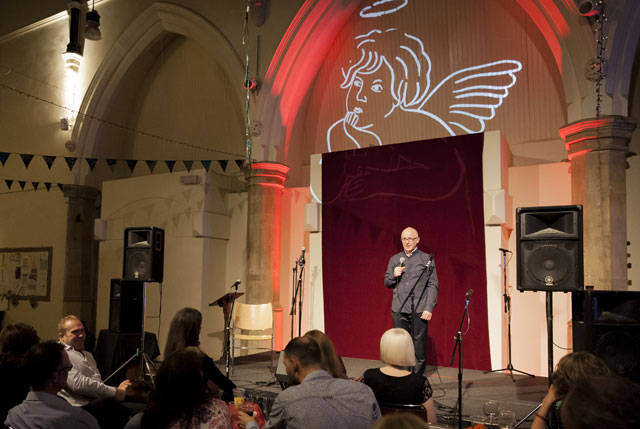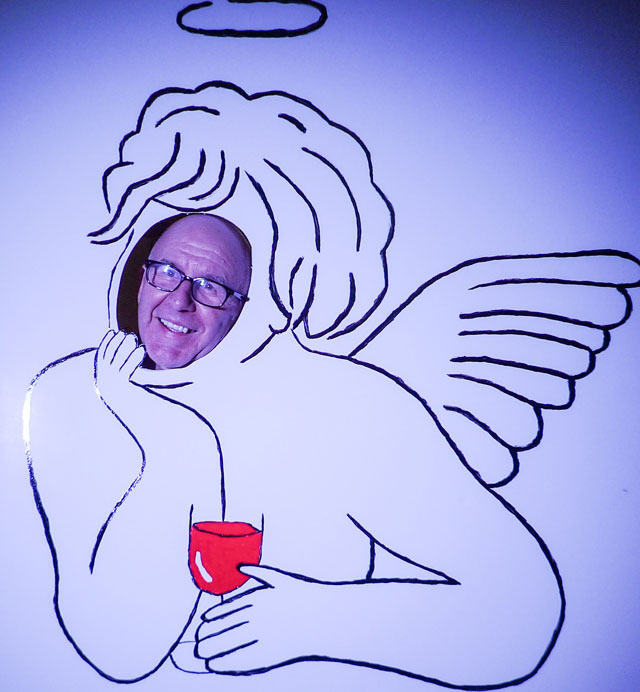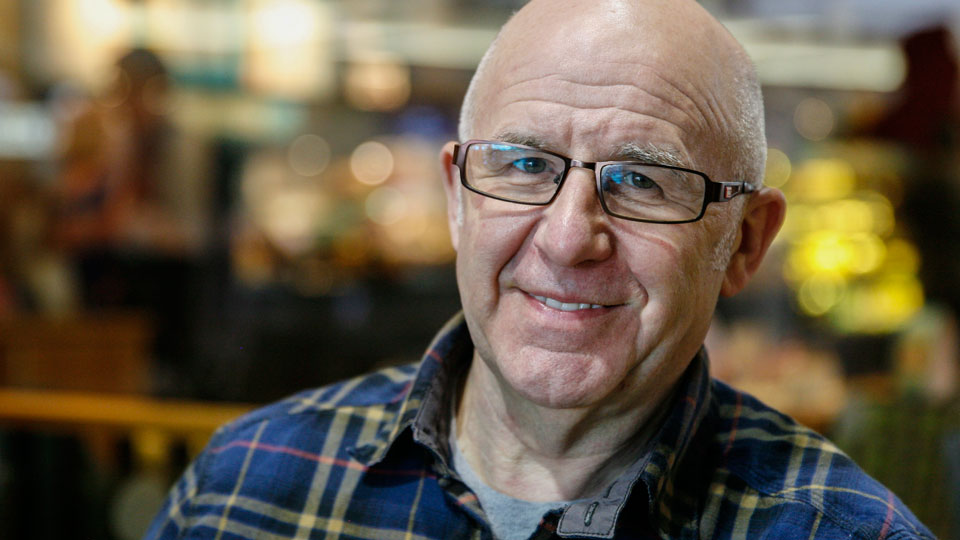We headed along to the launch party for Dave Tomlinson’s new book The Bad Christian’s Manifesto at St Luke’s Church in Holloway, where Dave is vicar.
Over the course of an evening of entertainment, with the church full to the rafters with Dave’s congregation and readers, we learned a lot about why the vicar and author resonates with so many people – whilst all the time bespoke Bad Christian ale and wine flowed.
Before the party was in full swing, we caught up with Dave for a one-to-one chat. As we spoke in the vestry, we learned about what motivated Dave to put his spiritual thoughts into writing in the first place; what his experience of taking Ronnie Biggs’ funeral was like; and just what exactly makes a Bad Christian?
Dave, how are you today?
I’m well. A bit kind of flustered trying to get this party together! Now, it’s too late, it’s going to happen!
When did you first decide to put your ideas onto the page?
A long time ago, but then it took me ages to get round to it. You have to set aside time and focus your thoughts. I wrote bits and pieces, but my first book was published in 1995, called The Post Evangelical. Probably all of my writing follows where my concern goes, which is people either on the edges of faith who are inside the fold but struggling to keep it together; or people outside. The Post Evangelical was written for people of an evangelical background who were suddenly finding that their faith didn’t make sense any more, and were perhaps assuming that that meant it was the end of the journey. That book was written to say that there are other ways of interpreting Christianity and faith.
So the impetus to write perhaps came from hearing people’s stories about problems they had with their faith?
Definitely. That’s a big part of where it’s coming from. At the end of the 1980s I wondered if I belonged in the church – I wouldn’t say my faith was seriously under threat, although it was going through a lot of rethinking – but I wasn’t sure there was a place for me in the church. So along with a bunch of other people I began a little group that met in a pub in South London called Holy Joe’s. It grew and lasted for ten years. A lot of what I’ve done has been following that, and trying to lift my voice wider and wider to people. For a long time it was focussed on people who were on the inside but struggling with issues; whereas the Bad Christian books are aimed at people who are outside altogether, who may not even dream that there’s a place for them in church or in religion. I’m not trying to get them to come to church: what I’m trying to say is, “I think God is part of your life whether you know it or not.” God is just a word anyway, so it doesn’t much matter which word you use. If the word ‘God’ offends you, if it doesn’t make sense to you, or if it perhaps has too many bad associations then forget the jargon! A lot of people say to me, “I don’t believe in God, but I think there’s something there.” So I would say, forget about the religious jargon and concentrate on that something that makes sense to you, which I would describe as God.

Where did the idea of the ‘Bad Christian’ come from?
It was inspired by a wonderful book called How to be a Bad Birdwatcher by Simon Barnes. I’ve always been interested in birds, since I was a little lad; so I picked up this book and realised it wasn’t like any book on birds I’d ever read before. He starts off saying he’s a bad birdwatcher; but it’s pretty obvious he’s a good one – he’s a patron of the RSPB! What he’s trying to do is take birdwatching as an activity out of the hands of geeks and twitchers and people with expensive binoculars and say that birds are part of everybody’s life, and that it doesn’t matter if you know that that’s a goldfinch or a blue tit or whatever, for you to enjoy their presence in your life. When I read it, I thought, “My goodness, I need to write a book,” because that’s what I think about religion. I think God is in the wrong people’s hands. We think of the God Squad as the people who go to church on a Sunday – but in fact I think that God is part of everybody’s life.
Have you found your books have reached a particular audience?
I hoped that the books would sell not just into the Christian ghetto, but that it would get into the general book trade and that it would reach people who are probably never going to come to church, but that doesn’t matter to me. The encouraging thing about How to be a Bad Christian is how far out there the book has gone, and how many responses every week, sometimes every day I get from people who’ve picked up the book, who are not churchy people, who tell me that it makes sense to them and has perhaps helped them to make sense of things they didn’t previously have a language for to make sense of.
Have you had any feedback that has surprised you?
I’m always sad by the negative and quite aggressive voices I get from the more establishment people – but that doesn’t surprise me because I’ve lived with that for quite a long time! But I have been surprised that some people, who you wouldn’t associate with spirituality or religious things, suddenly find that this resonates with them. Earlier this year I took Ronnie Biggs’ funeral, and the previous year I’d take Bruce Reynolds’, who was the mastermind of the Great Train Robbery. I met Ronnie at that funeral and read his tribute out, to Bruce. Then I was asked to take Ronnie’s funeral, and that introduced me to an amazing bunch of people and colourful characters! In the pub after Ronnie’s funeral I was with some people who at one level, you’d think are quite scary. But what I found was a receptiveness to me as a person and to what I had to say. I found that whilst religion had bad press for some, Jesus as a person resonated and they identified with him.
There’s a wonderful touching moment in The Bad Christian’s Manifesto about Ronnie Biggs’ granddaughter.
That’s right. She just saw him as her grandfather. The wonderful thing was that, amidst the eminent people who took part in that service – it was packed out with media – to have this one beautiful little girl standing up: she put the whole thing into perspective. People are interested in Ronnie Biggs because he’s this glamorous figure, and people see that in positive or deeply negative ways: but nobody is reduced to one event in their life. There’s far more to Ronnie Biggs than the train robbery that happened over fifty years ago. That’s true for everybody. We so easily put people into these little categories, and that enables us to feel safe because we’ve put them somewhere.
Was it that nobody else would take Biggs’ funeral, or were you asked to do it?
I was asked to do it, though I did get messages from people in the church who asked how I could do this. They felt I was glamorizing an ‘unrepentant criminal’. There’s a number of things about that. One: taking someone’s funeral is not about saying this person was a great person, necessarily. And two, there’s a massive judgement being made there. How do you know he was an unrepentant sinner? If you read his autobiography he apologises quite deeply at the beginning for the hurt that he caused to people. But again, once we’ve put somebody into a category then we can ignore them. We’re not challenged by them any more. But the great thing about Jesus is that he suffered exactly the same criticism. He spent so much of his life with people who were on the outside. One of the most obvious things about him is what theologians call ‘table fellowship’. He ate meals with people who were considered outcasts by the establishment, and certainly the religious establishment, so he ended up coming under accusations that he was a drunkard and a glutton and so on. There’s nothing new about that.

How would you categorise the Bad Christian books? They’re not apologetics, are they?
Not in any classic sense. I’m not trying to rationally present arguments for why people should believe in God. I think they’re evangelistic: though that’s a word I don’t like at all! But they’re about giving some good news to people, which is what I’m trying to do. It’s a bit of spiritual enlightenment. I would see myself as a theologian. I give a lot of my time to thinking about religion: but I don’t think that’s what’s needed in today’s world. We can argue about doctrinal points until the cows come home, and I’m willing to do that: but will it get us any further? People are looking more for a sense of meaning and purpose in their lives. At its best, that’s what religion can give. At its worst, it completely drives people away from those things.
A lot of that comes out in the stories you relate in the Bad Christian books. Were there any personal accounts you found more difficult than others to write about?
Obviously, I’ve needed to talk to those people, and find out that they’re willing for me to tell their stories. I might hide their identity somewhat, but mostly not, actually. People have been happy for me to tell their stories. There are other stories that I haven’t told, and I probably couldn’t for all kinds of reasons. But stories are so powerful: stories get through to us where a thousand arguments couldn’t. I think Jesus was a phenomenal storyteller. All the great people who influence our lives, when we watch films or television, it’s all storytelling, related to the human dilemma. Often in today’s world it can seem pretty hopeless, so trying to bring some shaft of hope into people’s lives, and show that there are ways of making sense, even of the most awful things. Broadly speaking, it’s about a kind of spiritual enlightenment, and being a guide to people who might be confused or lost, and are looking for a way forward.
Are there elements of pantheism to what you present in the books?
Well, it’s interesting. I’m actually more of a panentheist. Pantheism is the idea that God is everything. I have a number of problems with that idea. Panentheism is saying that God is in everything. That’s another philosophical and theological perspective, which is not something to drop in at parties. But for me it’s a very satisfying way of seeing things, because it was put rather well by St Paul when he was preaching in Athens. He tried to persuade people of his belief in Jesus by quoting from their own prophets and poets. He quoted this bit which said, “In him, in God, we live and move and have our being.” That to me is a very helpful statement. I think of God not as some entity in another part of the universe. I think of God as being like the air that is all around us and within us. So in a sense, you can’t get away from God. God is in everything, and everything is in God. So that’s basically what panentheism means. Rather than saying, “God is everything,” and therefore that God is exhausted by everything that is: that there’s nothing of God beyond the material world [pantheism].
The two Bad Christian books have very distinctive illustrations by Rob Pepper. How did they come about?
Rob’s a very dear friend. He and his wife were not really churchgoers, but were looking for something. They turned up here at St Luke’s one Sunday morning when I was beginning a set of sermons that became another book that I wrote called Re-enchanting Christianity. They liked what I said and decided to hang around for a while at least whilst I finished that series of talks, and we became very dear friends. They don’t live in London any more, but we’re still on the journey together. I really like Rob’s art. He’s an artist, not a designer as such; but it works very well. It crosses over between the two and I think, with his illustrations, he absorbs what I’m saying and finds a way to visualise it. Like the power of stories, there’s also the power of pictures, and I think pictures are important. Rob’s expressing in visual form the same kind of spirit that I’m trying to express in the writing.

I was interested to read in your closing manifesto, one of the points you make is: “To doubt and question without fear, and never be daunted by orthodoxies and authority figures.” That could equally apply to a scientific worldview, couldn’t it?
I could, and it would. My view of religion is like my view of life in general. I think that whether we’re looking at religion, politics, science, technology, I think that we so easily become intimidated by authority figures and orthodoxies. When you think of people who’ve changed the world in various ways, they’re people who’ve been able to step outside of that and question the given orthodoxies. That’s not to say that the orthodoxies are rubbish. I see myself as part of the Christian tradition. To me, tradition isn’t a package that you hand down from one generation to the next, and look after and keep exactly the same. A lot of people think that being faithful to the tradition means keeping it exactly the same as it was when it was given to you. I think that’s rubbish. I think tradition is more of a conversation, a debate, an argument even. If you look back through the history of the church, and in other religious traditions too, that’s how it’s been: constant argument. When you think about the creeds, people think they were handed down from God or something, or were created one day, but of course they evolved over centuries. They came out of these Councils which were really almighty arguments. They’re profoundly important and interesting, but the argument today is not the same argument. That’s the problem. That’s why the creeds can seem hopelessly irrelevant today, because they were grappling with apologetic issues that applied to an entirely different world. As I say in the book, in a post-Darwinian, post-feminist world, and various other posts-, everything changes. The sense of truth and reality changes. We can’t just churn it out in the same old way. The bible assumes a three-tier universe. Heaven up there, earth in the middle and hell below. So stories like the one where Jesus ascends to heaven on a cloud: it makes sense in the world in which it was written, but it makes no sense in ours: what would be up? If he was leaving Australia, he’d be going down from our perspective, surely? So a living tradition is one in which there is a constant heated debate going on. It’s not surprising that there are arguments in the church: there should be. But sometimes I think we’re having the wrong arguments. We’re having arguments that are completely irrelevant, arguments that may be over to the world outside. Arguments about whether we should have women bishops, for instance: and we will, eventually! To the outside world it looks incredible: how can we still be arguing about that? I think the same about same-sex relationships. These are done deals. They’re arguments that are over now, really, to any sensible people.
Do you have any more books you’re working on?
I’ve agreed to write another one, but I haven’t yet decided what it is! What people keep asking me to do is something along the lines of How to Build a Bad Church. A lot of people come to a church like St Luke’s and wonder, “Why can’t we have a church like that where we are?” There’s so many people who are feeling increasingly uneasy in the church but don’t know where to go. And then there’s all the masses of others who probably would come, if they could find something that represented the sort of values that they feel strongly about. That may well be the case: it’s one of my projects. How can you go about changing the church? That is probably going to stretch me to some of my greatest miracles!
We wish you luck and we’ll watch out for the next book. We’ll let you get back to the party, but thank you for talking to us, Dave.
Thank you!
Dave Tomlinson’s How to be a Bad Christian and The Bad Christian’s Manifesto are available now, published by Hodder & Stoughton. You can follow Dave on Twitter @goodluker as well as @HodderFaith for news on all their titles.


